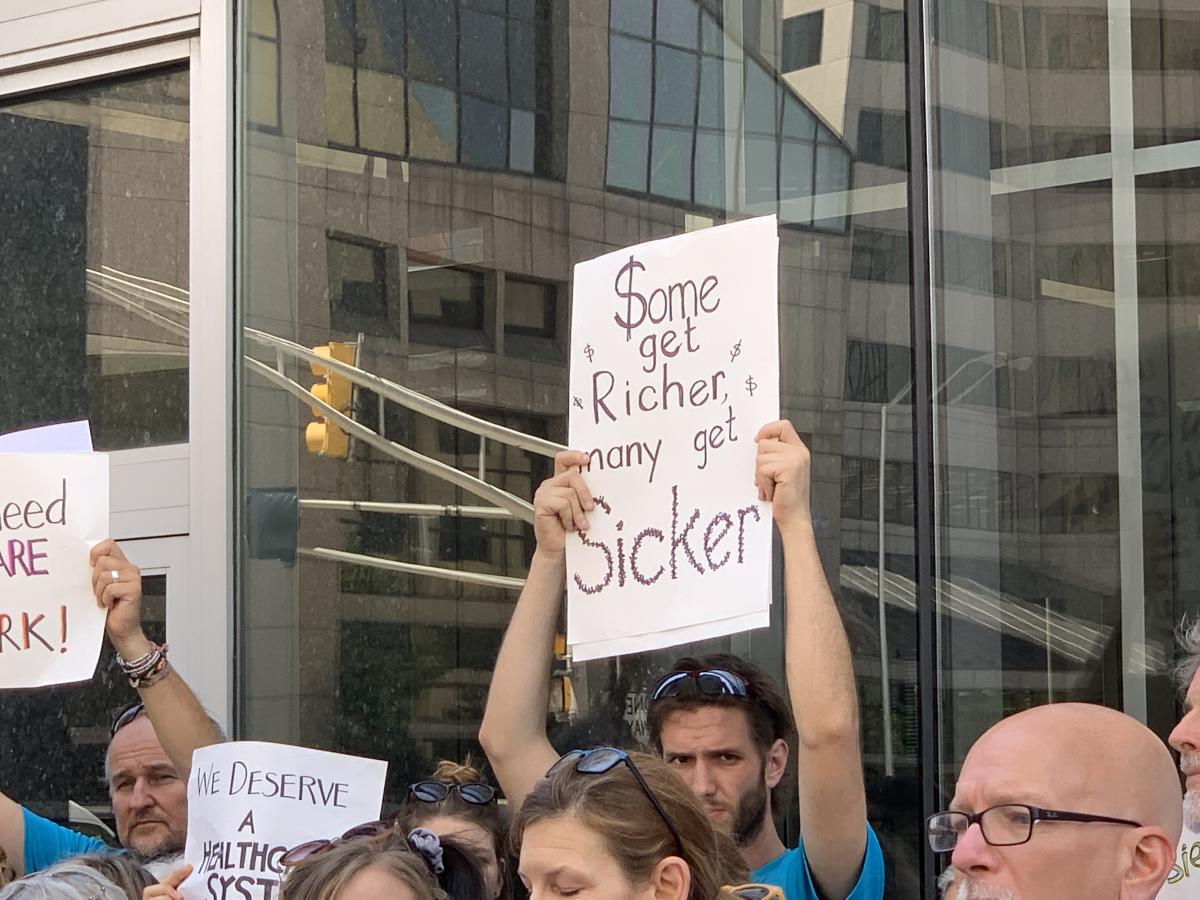A version of this column by our editor was published last week in The Hill. Faith organizations that support the Medicare Negotiation and Competitive Licensing Act include American Muslim Health Professionals, Interfaith Center on Corporate Responsibility, and NETWORK Lobby.
House Speaker Nancy Pelosi has spent her entire life immersed in the Democratic Party, so she knows well the history of its leaders’ most momentous legislative accomplishments. Minor tweaks to a broken status quo are not on that list.
President Franklin Roosevelt’s New Deal is. So is the Medicare program secured by President Lyndon Johnson. Those landmark achievements carry with them a lesson for the Speaker and her Congressional colleagues as they consider how to respond to the American public’s deep frustration with prescription drug prices.

It is hard to overstate the depth of that frustration. Unchecked pharmaceutical corporations are running wild, pricing medicines as high as $2.1 million . The average price of new cancer medicines is $149,000. These skyrocketing costs force nearly one-third of Americans to skip doses or fail to fill prescriptions each year. Some of those skipping doses are senior citizens enrolled in Medicare, unable to meet co-pays, deductibles, or premiums required in the Part D prescription drug program.
Voters consistently tell pollsters that fixing this drug pricing crisis should be one of Congress’ top priorities. A remarkable 92% of Americans support the U.S. being allowed to negotiate the cost it pays for medications via Medicare. That would change the current law that blocks the federal government from using its purchasing power to bargain for lower prices.
Voters from both parties agree that it is high time to cancel this meet-your-price guarantee, a shameless 2003 political giveaway to the pharma companies that are reliably at the top of campaign contribution lists. With Medicare accounting for almost 30% of national drug spending, the program’s lack of negotiating power is a top reason why prescription costs in the U.S. are the highest in the world.
Democrats have pledged to unshackle the government’s bargaining handcuffs. Some Republicans have successfully campaigned on the same promise. Among them is President Trump, who has repeatedly stated he supports negotiating drug prices, even claiming taxpayers could save hundreds of billions of dollars by doing so.
The legacy of Roosevelt and Johnson should show Speaker Pelosi and her colleagues that the current crisis presents an opportunity for meaningful change. Roosevelt took advantage of the national anxiety over the Depression to pass much of his New Deal in just 100 days. Johnson pushed through Medicare in 1965 in response to mounting concern over medical costs forcing seniors into poverty.
The current furor over prescription drug prices gives Democrats today a chance for a similar remarkable breakthrough. Yet there are multiple reports that the Speaker and House leadership is considering a response that is remarkable only in its timidity. The plan reportedly under discussion would allow the Health and Human Services secretary to negotiate Medicare prescription drug prices, but only to a point. The number of drugs subject to negotiation would be limited. And the drug companies could refuse to budge and instead push the process to arbitration. While proponents of this idea have pointed to Germany’s experience with an arbitration-based model, that model has only lowered drug spending by 5%.
Over a hundred members of Congress, led by Rep. Lloyd Doggett (D-Texas) and Sen. Sherrod Brown (D-Ohio), are pushing for a far better approach. The Medicare Negotiation and Competitive Licensing Act brandishes the significant stick the government possesses in any drug pricing scenario: the monopoly patents the government awards to corporations, even on medicines discovered with taxpayer funding.
These monopolies on life-essential medicines enable the take-it-or-leave-it price-gouging that causes so much suffering and even death. Under the Doggett-Brown legislation, companies that refuse to negotiate in good faith on Medicare costs won’t have the option of hiding under the skirts of an arbitration process. Instead, companies that balk at selling their drugs for fair prices would face losing their monopolies on those drugs. The government would then license competing companies to produce generic versions of the medicines, at a fraction of the cost of the monopolized price.
Speaker Pelosi and your fellow Democrats, the time is ripe for you to lead a long-overdue reversal in the deadly rise of prescription drug costs. As the ghosts of FDR and LBJ would tell you, fortune favors the bold. So does history.
Faith and Healthcare Notes
Which Country Really Rations Healthcare? While anti-Medicare for All scare tactics feature the prospect of rationed healthcare, a new Commonwealth Fund report compares the U.S.’s current system to five European countries and finds: "In reality, more people in the U.S. forgo needed health care because access to care is rationed through lack of access to adequate insurance or unaffordable services and treatments."
For Example . . . Our friends at T1International released their annual insulin cost and access survey, reporting that over 25% of persons with Type 1 diabetes surveyed from the United States confirmed they have been rationing insulin within the last year due to cost. That is by far the highest rate of any high-income country.
And When Patients Do Get Care . . . The resulting bills are often are overwhelming, with nearly 60% of Americans filing bankruptcy reporting healthcare costs were a contributing factor.
